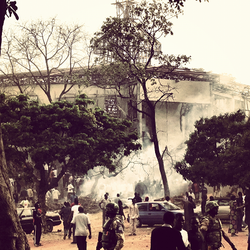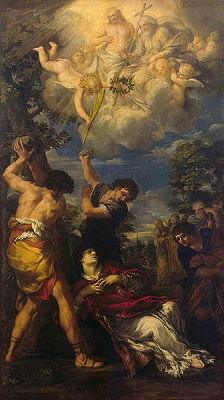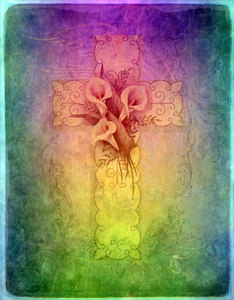
William Stark, Regional Manager for Africa
04/24/2013
Washington, D.C.
International Christian Concern
Recently, President Goodluck Jonathan called on the federal government of Nigeria to set up a committee to consider whether Boko Haram should be granted amnesty for crimes the group has committed across Nigeria's northern states. The announcement came on the heels of a suicide bombing of a bus station in a Christian neighborhood likely perpetrated by Boko Haram. As deadly attacks continue, Christians are left dumbfounded and wondering why the government is considering granting amnesty to the extremist group.
Boko Haram's Latest Attack
On March 18, two suicide bombers rammed a car loaded with explosives into a bus parked at the New Road Bus Station in Sabon Gari, a Christian neighborhood of Nigeria's northern city Kano. After the suicide bombers' car detonated, a series of explosions followed, claiming the lives of at least twenty people. "I saw three buses on fire. One of them was loaded with passengers waiting to leave the station at the time of the blasts," a rescue official told the African Free Press. Boko Haram is suspected to have masterminded the bombing, but the group has yet to officially take responsibility.
As a part of the extremist group's campaign to carve out a separate Islamic state in Nigeria's northern regions, Boko Haram targets Christians for deadly attacks including drive-by shootings and church bombings. "We have made it clear that most of the victims of Boko Haram are Christians, whose only offence is their choice of worship," Nigerian American leaders said in a statement released by the Christian Association of Nigerian-Americans (CANAN).
In 2012 alone, Boko Haram is estimated to have bombed 14 churches across northern Nigeria. In order to affect maximum casualties, the group often commits these atrocities while Christians are worshiping inside their churches.
Amnesty Granted to Murderers, Justice Denied to Victims
In March, Abubakar Sa'ad, the Sultan of Sokoto and spiritual leader of Muslims in Nigeria, asked the federal government to grant members of Boko Haram "total and unconditional amnesty" to bring peace to the country's northern states. The rationale behind the sultan's proposal was that a presidential amnesty would allow many Boko Haram militants to lay down their arms.
Initially, President Jonathan rejected this proposal, but in the first week of April, the president called for a committee to be set up to consider granting Boko Haram militants amnesty.
Immediately, Christian organizations called on the president to reconsider his decision and began to question the logic behind the establishment of this committee. Laolu Akande, the Executive Director of CANAN, released a pointed statement opposing the consideration of amnesty.
"This is shaping up to a certain manifestation of the theater of the absurd. Not that Nigeria is not used to such perfidious propositions, it is the total despising of the murdered, traumatized and maimed victims of the terrorists that make this situation a pervasion," Akande said of the government's amnesty consideration.
Akande went further and said the government has committed a "treachery" against the wives, children and relatives of the victims of Boko Haram by setting up this committee.
The Northern States Christian Elders Forum (NOSCEF) also released a statement opposing the government's plan to consider granting amnesty to Boko Haram. Matthew Owojaiye, the chairman of NOSCEF, expressed his disgust over the fact that the government was planning to appease Boko Haram before coming to the aid of the group's victims.
The Christian Association of Nigeria (CAN) released a similar statement saying, "For [the government] to come out and say there should be amnesty for [Boko Haram] without considering the people that have been made widows and orphans [and] without considering the places of worship and schools that have been burnt down, is insensitive. In calling for amnesty, [the government] never mentioned those widows, those orphans; they never mentioned the grave injustice that has been done to Christians."
Will Amnesty Actually Bring Peace?
A statement released by Boko Haram in January casts doubt on whether amnesty would even bring peace to northern Nigeria. "We will consider negotiation only when we have brought the government to its knees... You don't put down your arms in Islam, you only put them aside."
The group's purported leader also released a statement rejecting any potential amnesty deal, insisting that the group has "not committed any wrong to deserve amnesty." This statement was made with full knowledge that Boko Haram is responsible for over 3,000 murders in northern Nigeria, many of whom were private Christian citizens killed in attacks much like the suicide bombing at the New Road Bus Station last month.
Boko Haram's radical ideology, coupled with its fractured and shadowy nature, indicates that an amnesty deal would do little to stop the violence in northern Nigeria and would just put an official stamp on the denial of justice Boko Haram's victims have so far endured.
For interviews, contact William Stark, Regional Manager for Africa: [email protected]
# # #
You are free to disseminate this news story. We request that you reference ICC (International Christian Concern) and include our web address, www.persecution.org. ICC is a Washington, D.C.-based human rights organization that exists to help persecuted Christians worldwide. ICC provides Awareness, Advocacy, and Assistance to the worldwide persecuted Church. For additional information or for an interview, contact ICC at 800-422-5441.
International Christian Concern
2020 Pennsylvania Ave. NW #241
Washington, D.C. 20006
www.persecution.org | E-mail: [email protected]


 RSS Feed
RSS Feed